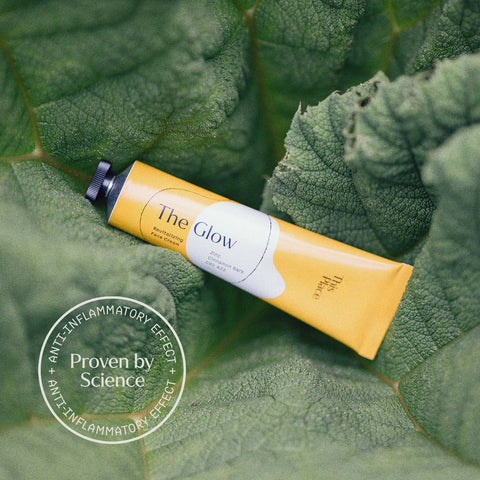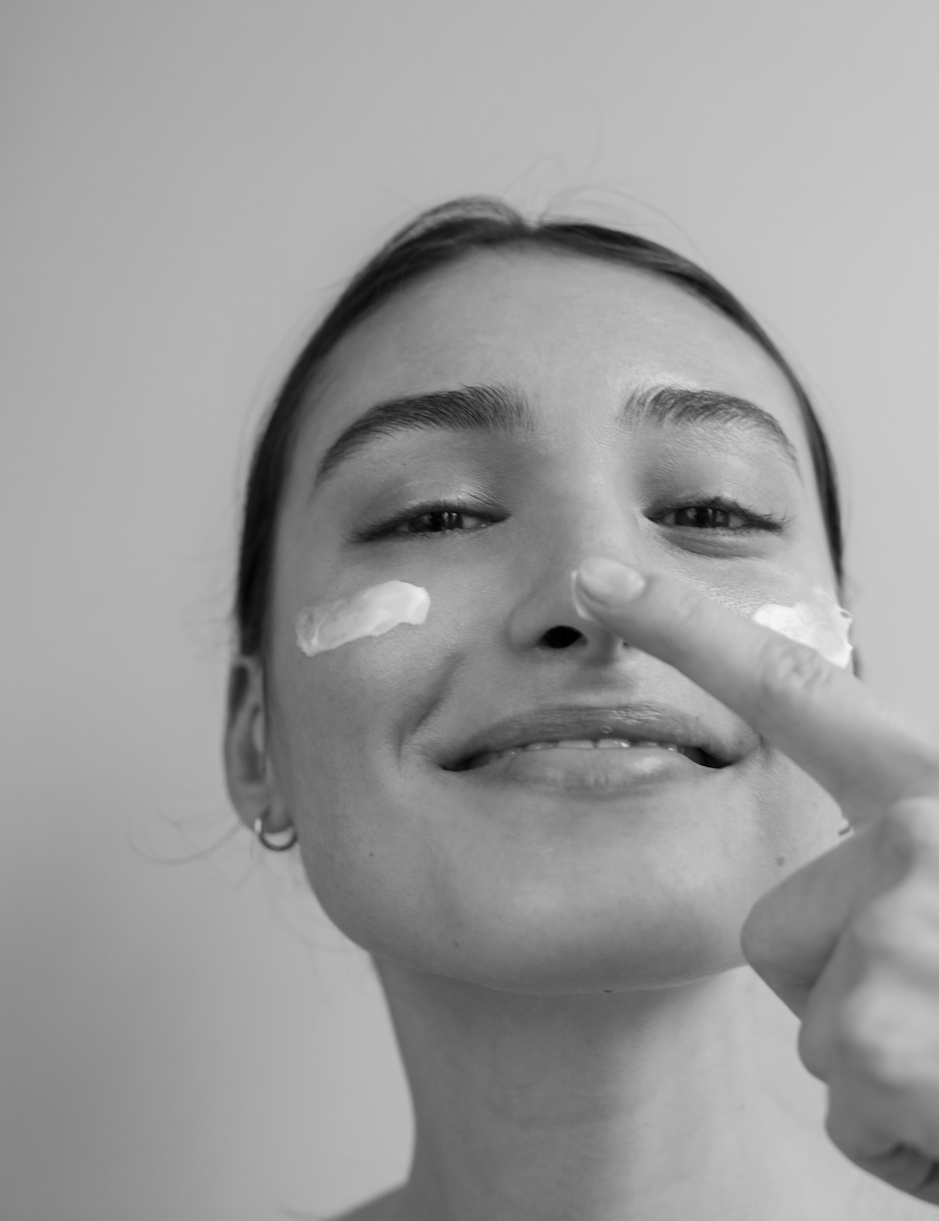There's no doubt: when a pimple appears on our face, we urgently want to eliminate it. However, if we aim for clear skin in the long run, we must address potential triggers for blemishes first.
In addition to genetic predisposition and hormonal fluctuations - such as in puberty or during your monthly cycle - various external factors can cause pimples and blackheads. Fortunately, while the causes are numerous, we also have several options to combat these troublesome companions.
Achieving healthy skin requires a combined approach, incorporating long-term preventive measures and immediate solutions for emergencies.
So, there's no need for you to already know everything. We've got you covered with the most important things you need to know.
At a Glance: Blemish-SOS |
Home Remedies for Blemishes
When dealing with an inflamed blemish that refuses to heal, prompt assistance is often necessary.
Research has shown that tea tree oil can be equally effective as a proven drug typically used in such cases. Furthermore, rare and undesirable side effects were observed less frequently with tea tree oil [1].
It's important to note that tea tree oil should never be used undiluted, as it can be highly irritating otherwise.
Instead, add a few drops of tea tree oil to your cream or face oil. As a general recommendation, mix approximately 7 drops of tea tree oil with 100 ml of your skincare product. Test the mixture on your elbow first to ensure it's suitable for your skin. Avoid using it near sensitive areas like the eyes and mouth.
Apple cider vinegar and garlic are also often mentioned as effective home remedies for pimples.
In our article on home remedies for pimples, we reviewed a few studies on these remedies. You can find the results and recommendations there—what home remedies you can confidently apply and what to be cautious about.
However, it may also be worth taking a step back and addressing the underlying causes of pimples first, and then taking measures to avoid them altogether.
Can Stress Cause Pimples?
The term "stress blemish" is well-known to most of us. But can stress actually cause pimples? Yes - at least some studies suggest so.
In one study involving 144 university students, a strong correlation between perceived stress levels and the severity of acne was found [2]. Similar observations were made by researchers in another study [3].
In the field of Psychodermatology, a meta-analysis was conducted, examining 22 studies, and it suggested that various psychological interventions in the treatment of skin diseases might be effective [4]. There is a potential link between acne and psychological factors, but further research is needed to make more precise statements about it.
Implementing Rituals to Reduce Stress
We can achieve two benefits at once by integrating rituals into our daily lives that help us relax regularly. Not only do these rituals help prevent stress, but they also serve as healthy coping mechanisms when stress becomes unavoidable. These rituals don't always have to be meditation; something as simple as mindfully drinking a cup of tea, engaging in sports, or taking a walk in the fresh air can bring calmness to our everyday lives.
Another option we can consider, which is gaining popularity, is CBD. Some researchers believe that CBD may be involved in regulating stress responses. To ensure the best quality, we use high-quality hemp extract from Swiss outdoor cultivation in our products. By combining these products with small rituals, we create moments to unwind and find peace.

Quick Overnight Fix for Pimples: Get more Sleep, but Cut Back on Alcohol and Nicotine
Speaking of coping mechanisms: it's a well-known fact that increased stress doesn't necessarily result in a healthier lifestyle. In fact, it often leads us to adopt habits that can create even more stress in the long run.
According to a study, inadequate or poor sleep, alcohol consumption, and smoking (although harmful, are common reactions to stress) can also elevate the likelihood of developing blemishes [5].
At least one of these potential triggers can be alleviated with our products: "The Good Night" offers not only room for your unique evening ritual, but also offers the potential to aid in quickly falling into a restful slumber, thanks to the natural melatonin it contains.
Can a Specific Diet Help with Pimples?
Studies suggest that a diet rich in foods with a low glycemic index can improve the symptoms of acne [6] [7] [8]. The glycemic index indicates how much carbohydrate-containing foods affect blood sugar levels. Wholemeal spaghetti fare better off in this regard than a baguette.
In this table, you can find an overview of the glycemic index of many foods.
Other studies have indicated that cow's milk may potentially increase the risk of blemishes [9] [10] [11]. This effect was observed for both whole milk and low-fat milk.
However, reliable studies with clear results are still lacking, and until then, the relationship between nutrition and pimples remains controversial.
Tips and Tricks: Find Out What Works for You
However, what ultimately works best, everyone may have to figure out for themselves. Initially, it may make sense to eliminate certain foods that we suspect might contribute to the development of pimples. For some of us, dairy products might be a trigger, while for others, it could be carbohydrate-rich products.
Alternatively (or additionally), you can keep a food diary for a while (which can be easily done with your phone) and see if you can identify any links between the consumption of certain foods and your skin health.
Throughout this process, we should not be too hard on ourselves. Exceptions are allowed here. And despite all the self-optimization, remember that food is meant to be enjoyed (and should be!).

Skin Care For Blemishes
Last but not least, in addition to using cosmetics with healing ingredients, such as our innovative face cream, "The Glow", which contains zinc, cinnamon, and CBD, you can take extra care to clean your face gently. Check your products for so-called "comedogenic ingredients" - substances that can cause blemishes.
For persistent and severe blemishes, it's advisable to consult a dermatologist for professional advice and treatment.
Most Important Take-Aways
On the way to clear skin, various factors can play a role. A combined approach can help reduce pimples, minimize pores, avoid blackheads and blemishes, and keep them at bay in the long run.
And even if it's not always easy: Our skin also relies on our patience and benevolence.
Keep in mind: Supposedly "quick" solutions (such as squeezing pimples on your own) can worsen the situation in the long term and cause inflammation.
FAQ
How to Reduce Pimples Overnight
Among our tips and tricks against pimples, Aspirin is like a little miracle cure. The painkiller contains salicylic acid, known for its anti-inflammatory and antibacterial effects. Simply crush the Aspirin tablet and mix it with water to form a thick paste. Then gently dab the substance on the skin or the affected areas on the face or back and let it work overnight.
How to Heal Pimples the Fastest
Home remedies can be beneficial in the healing of pimples. Effective methods include steam baths with herbal essences like chamomile, and soothing skin care with aloe vera or honey. Exposure to red light can also be helpful as it promotes blood circulation in the skin and aids in alleviating inflammation.
How to quickly dry out a pimple?
To quickly dry out a pimple, there are several home remedies that offer quick relief. One popular option is using lemon juice, which can be mixed with water and applied to the affected areas using a cotton swab. This is believed to dry out the pimple overnight and kill bacteria.

